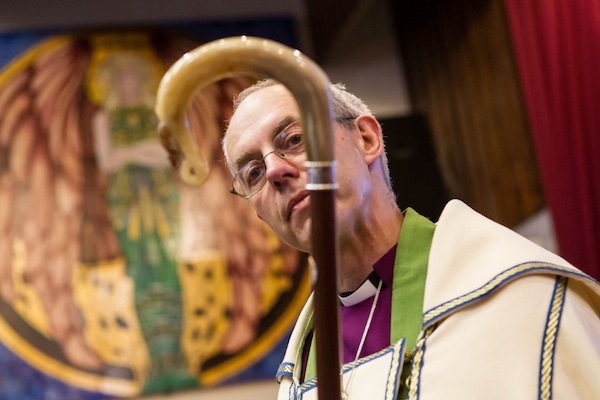The new Archbishop of Canterbury has the cleanest-shaven chin I think I have ever seen on an adult male human. It is as if, in an attempt to rid himself of even the vestigial suspicion of facial growth, he has shaved twice with a Gillette Mach 3 Turbo™ razor, and then applied those molten wax strips that women use these days on their front bottoms — for reasons of hygiene and personal comfort, we are assured. I am not saying that Justin Welby actually does this, or has it done to him by some attendant vicar, merely that it looks that way. Exfoliating wax strips are certainly not something one would associate with the evangelical wing of the Church of England, although it would not surprise me if they were utilised now and again for slightly odd purposes at the higher end of the church.
Welby has also been at pains to assert that he is something which most new appointees to big important jobs — such as -director-general of the BBC, for example — are usually determined to suggest that they are not — i.e., in his words, ‘thick’. One assumes that both the impeccably smooth chin and his avowal of thickness are designed to position him as far as is humanly possible from his predecessor, who was considered an ‘intellectual’ and possessed the finest beard in Christendom. I suspect he will be heard in the coming weeks to put still further distance between himself and Rowan Williams by expressing a fervent dislike of Muslims and Dostoyevsky.
His first real task, however, is to lead the opposition to the government’s plans to impose gay marriage ceremonies upon religious institutions which almost unanimously (except for the bloody Quakers, as usual) oppose this. Even Dr Williams was against the idea of homosexuals being married in church — or at least I think he was. His principal point seemed to be that the government did not have a mandate to do this because it wasn’t in the manifesto, etc. He did not talk about the unique nature of marriage as being between a man and a woman and still less howl that he would not allow the sodomites to desecrate God’s house. Perhaps Justin Welby will make a better fist, so to speak, of putting the theological and moral objections, because if I’m honest I don’t think old Rowan’s heart was quite in it.
It is a fight which Welby will probably lose. All of the mainstream parties are pretty much signed up to the notion that homosexuals should be allowed to get married wherever they so wish — and I look forward to the first gay wedding in a mosque; the reception should go with a bang. This week the Chancellor George Osborne took time off from his important task of destroying the country’s economy to insist that the Tories must not drop their plans for gay weddings, and cited the defeat of Mitt Romney as a harbinger for what would befall the Conservatives if they did not, you know, move with the times and stop being toxic and so on. Similar sentiments were espoused, in identical language, in every one of your daily newspapers by socially liberal commentators the day after Romney’s defeat. Obama won the election by corralling all the ‘minority’ (and not so minority) interest groups: homosexuals, Hispanics, women who are anxious to have an abortion, black people and so on, and therefore if either the Republicans or the Tories wished to win in the future, they would have to embrace these people — and, therefore, their values. Indeed, Osborne also urged upon his party a commitment not to lower the number of weeks at which an abortion can be carried out.
But surely the purpose of a political party is not simply to whore itself out, wholesale, to whichever tranche of the population is deemed to be crucial at any one time? Isn’t principle supposed to come into it somewhere? Nor am I convinced that this approach necessarily works pragmatically. On the issue of gay marriage, for example, it is not entirely true that, as Osborne asserted, the opinion polls suggest ‘a big majority’ of people are in favour of it. The polls are confusing at the very least. Those conducted by YouGov, for example, have shown support for gay marriage varying between 43 per cent and 71 per cent in favour over the space of a few months. When asked the question if the Church of England should be forced to conduct gay marriages, 47 per cent said ‘no’ and only 37 per cent said ‘yes’. It may well be that respondents are not quite sure what is meant by ‘gay marriage’ (as opposed to, say, civil partnerships). And it may also be the case that for many people in the country the issue ranks at about No. 579 on their list of important things for the government to do and that truth be told they couldn’t really give a monkey’s either way. Reader, I fall into this category.
Nor are the other people to whom Mr Osborne wishes to reach out necessarily in favour of gay marriage and a liberal approach to abortion. I would suggest that it is more likely than not to deter Muslim voters and black voters from supporting the Conservative party; both of these groups would quite like to vote for a party which was more socially conservative. I offer all this just as a small corrective to the triumphal fugue of liberalism which accompanied Barack Obama’s victory.







Comments